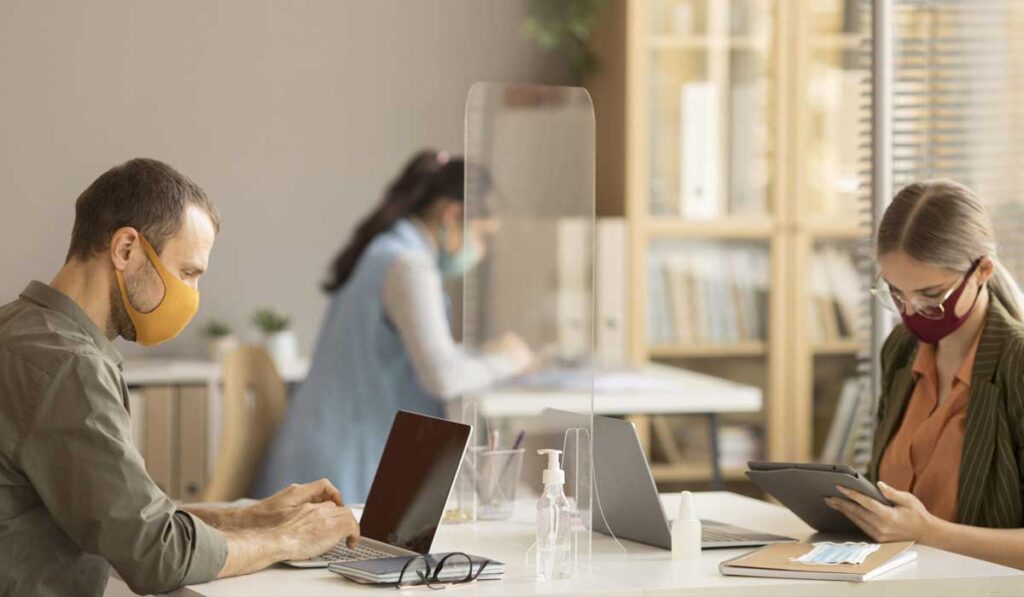Monique Vieira Lessa
Lawyer at Marcos Martins Advogados
With the advent of the pandemic, society has had to reinvent its habits, the way it deals with others and the environment around it. Labor relations have been no different. Since the beginning of the spread of the virus, companies have had to adapt to government measures and the guidelines of health authorities to prevent contagion.
The Federal Constitution, labor legislation and the Civil Code determine the employer’s obligation to ensure the health and safety of its employees, and it is not up to companies to take care of the work environment and invest in the safety of their employees.
Thus, the emergence of COVID-19 has brought additional obligations to the employer’s duty to ensure the health and safety of its employees. In addition to the safety measures inherent in the companies’ activities, they must also adopt all possible safety measures to prevent their employees from coming into contact with the virus, adapting the workplace and providing PPE in accordance with the parameters indicated by the competent authorities, in order to avoid legal claims in this regard.
Not only that, companies must also monitor whether the measures adopted in the workplace are being complied with by employees, penalizing them if they are not, since the Labor Courts understand that just providing PPE and adopting safety measures does not exempt the employer from any compensation.
Corroborating this understanding, the judge of the 02nd Labor Court of Dourados, Mato Grosso do Sul, dismissed a public civil action brought against a meatpacking company, which requested that the defendant be ordered to pay compensation for moral and material damages to workers who contracted COVID-19 or were exposed to the virus because of their working conditions.
As one of the grounds for his decision, the magistrate pointed out that the defendant company had implemented and improved measures to prevent and combat COVID-19 with each visit by the labor inspectorate, such as: providing and monitoring the use of masks – with a color scheme “to make it easier to see possible ‘offenders’”; temperature measurement; distancing and reducing the number of people in the transport provided by the company; monitoring and active search for cases; preventive measures for those belonging to the risk group; providing 70% alcohol in the rooms, as well as instructions for cleaning; among others.
Therefore, as there was no evidence of any negligence or omission on the part of the company in relation to the health of its employees or compliance with the biosafety measures required by law, it dismissed the action.
In the same vein, the 4th Panel of the Regional Labour Court of São Paulo (2nd Region) recognized the indirect termination of the employment contract of an employee of a transport company, since the company demanded that the worker return to on-site activities without, however, taking the necessary precautions to prevent the worker from becoming infected with the coronavirus.
According to the rapporteur of the ruling, Judge Paulo Sérgio Jakutis, “exposure to crowds, such as those that, especially at peak times, occur in public transport, is already a factor of considerable risk of contagion in times of the Covid-19 pandemic. If the employer, under these conditions, still forces the worker to face this situation without at least providing masks and material for hand hygiene and the workplace, it ends up aggravating the situation and exposing the worker to (avoidable) risk of greater intensity.”
It should be noted that these decisions are not isolated. In the face of constant demands, case law has established the understanding that it is the employer’s responsibility to keep the work environment safe for workers, including with regard to the coronavirus.
It is therefore of the utmost importance for companies to adapt to the new reality resulting from the pandemic, adopting all possible preventive measures against contagion, observing the guidelines provided by government authorities and current legislation, in addition to correctly documenting these measures, emphasizing the need for legal advice, in order to correctly identify the rules and comply with them.








